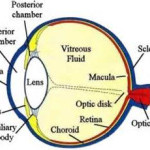Category: Science
Created by: SharfuddinR
Number of Blossarys: 11
 English (EN)
English (EN) Bulgarian (BG)
Bulgarian (BG) Vietnamese (VI)
Vietnamese (VI) German (DE)
German (DE) French (FR)
French (FR) Chinese, Hong Kong (ZH)
Chinese, Hong Kong (ZH) Korean (KO)
Korean (KO)
 Italian (IT)
Italian (IT) Catalan (CA)
Catalan (CA) Danish (DA)
Danish (DA) Japanese (JA)
Japanese (JA) Chinese, Simplified (ZS)
Chinese, Simplified (ZS) Norwegian Bokmål (NO)
Norwegian Bokmål (NO) Tamil (TA)
Tamil (TA) Polish (PL)
Polish (PL) Estonian (ET)
Estonian (ET) Slovenian (SL)
Slovenian (SL)
眼睛的背面蓋。視網膜與大腦直接相連的神經傳輸一種視網膜是大腦的光敏感擴張的衝動。封底或視網膜的兩種類型的照片受體的儲存格,杆和錐狀細胞組成。因為不同類型的受體,眼睛看到與廣泛不同光照條件下平等基金。看到太有效率是輕或中度的陰影中完成的。人眼可以想像周圍通常在不同的光照條件下的東西。看到在一個房間裡,由 100 燈照亮的物體會有不同的外觀很少如果九十歲的燈關掉。視網膜調整到較低的照明水準。對人的眼睛沒有這種東西或之下或之上和相機的情況下曝光。根據不同光照條件和它的視網膜變化的敏感性可能很容易會發生變化每小時和會受疾病、 疲勞和其他條件。聲巨響將減少紅眼睛的敏感性,並提高綠色的敏感性。同樣的事情可以發生與強大的口味和顏色。
Vỏ mặt sau của mắt. Võng mạc kết nối trực tiếp với não bằng dây thần kinh mà truyền xung động một cách võng mạc là một mở rộng nhạy cảm ánh sáng của não. Vỏ mặt sau hoặc võng mạc bao gồm hai loại tế bào thụ thể ảnh, thanh & tế bào hình nón. Bởi vì các loại khác nhau của thụ thể, mắt nhìn thấy với các cơ sở bình đẳng trong cường độ ánh sáng khác nhau rộng rãi. Các nhìn thấy quá hiệu quả thực hiện trong bóng tối nhẹ hoặc vừa phải. Mắt có thể hình dung những thứ xung quanh bình thường dưới các điều kiện khác nhau của ánh sáng. Một đối tượng nhìn thấy trong một căn phòng được thắp sáng bởi đèn 100 sẽ khác nhau trong sự xuất hiện rất ít nếu chín mươi đèn tắt. võng mạc điều chỉnh mức độ ánh sáng thấp. Mắt có là không có những điều như dưới hoặc qua tiếp xúc như trong trường hợp của một máy ảnh. Sự nhạy cảm của những thay đổi võng mạc dưới điều kiện ánh sáng khác nhau và nó có thể dễ dàng thay đổi từ giờ và bị ảnh hưởng bởi bệnh, mệt mỏi và điều kiện khác. Âm thanh lớn sẽ làm giảm độ nhạy màu đỏ mắt và tăng độ nhạy của màu xanh lá cây. Cùng một điều có thể xảy ra với thị hiếu mạnh mẽ & màu sắc.
By: SharfuddinR

